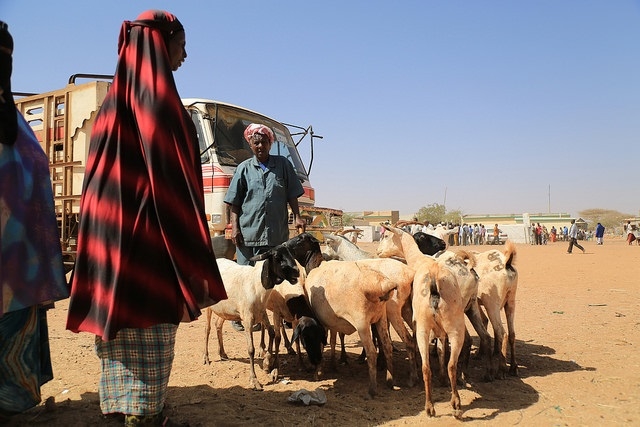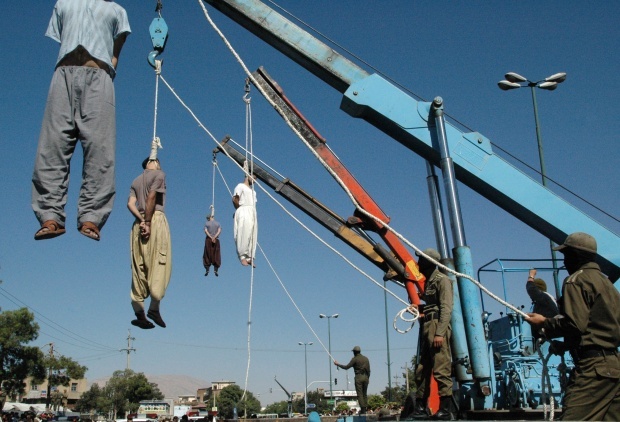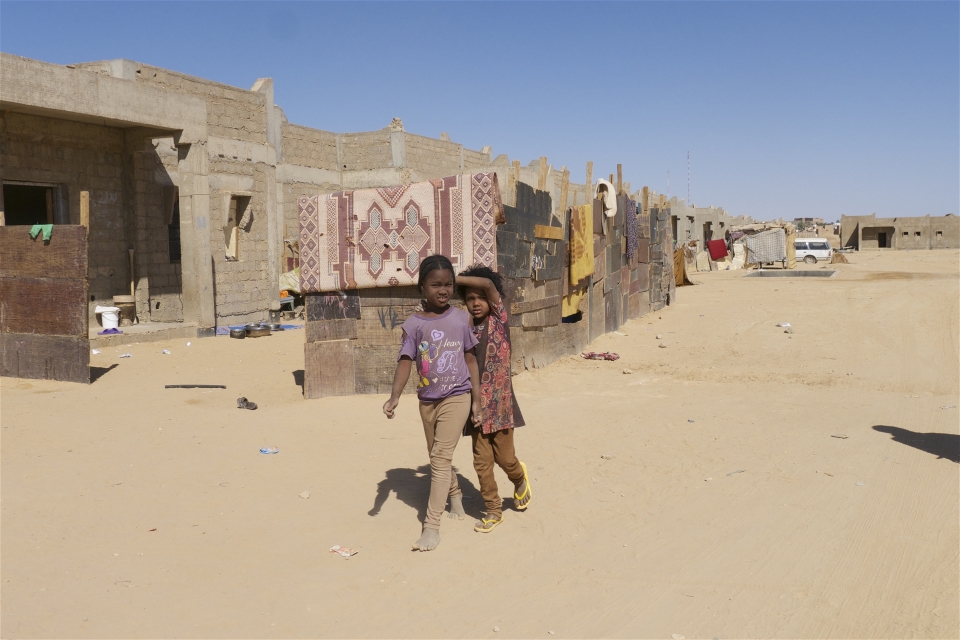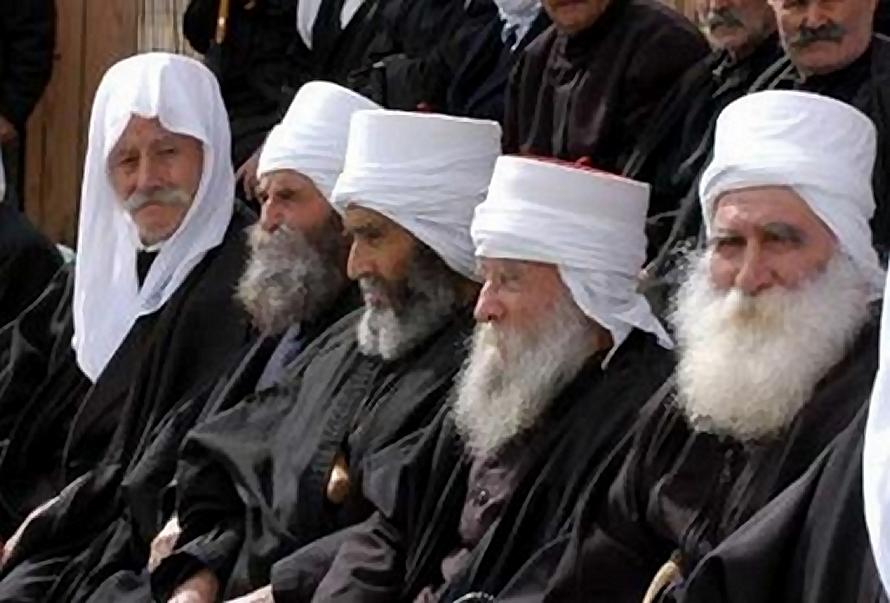From Our Daily Report
-
Colombian police agents arrested Santiago Uribe, brother of ex-president Álvaro Uribe, for alleged involvement in the bloody "12 Apostles" paramilitary group.
-
Leaders of Colombia's indigenous peoples have volunteered to have their autonomous authorities oversee the controversial "demobilization zones" for FARC fighters.
-
The International Criminal Court opened its case against captured militant Ahmad al-Mahdi for destruction of religious and cultural heritage during the jihadist occupation of Timbuktu.
-
The year's first self-immolation in the Tibetan region was reported as a monk burned to death in Kardze prefecture. An exile-born Tibetan youth survived his self-immolation in India.
BERBER NEW YEAR IN A UKRAINIAN CHURCH

by Bill Weinberg, The Villager
All Saints Ukrainian Church on East 11th Street, with its colorful mosaic facade, was the unlikely venue on Saturday Jan. 16 for the metro area Berber community's celebration of their traditional new year holiday, Yennayer. On the wall of the church's downstairs meeting space, paintings of orthodox saints formed a backdrop to the flag of Kabylia—the increasingly restive Berber region of Algeria's northern mountains. By an interesting chance, it has the same blue and yellow colors as the Ukrainian flag. It was still a little odd to hear strains of North African music and eat delicious couscous in a Ukrainian church.
The Berbers were in North Africa for thousands of years before the arrival of the Arabs in the seventh century. 2016 is 2966 in their calendar, which starts counting from the founding of a Berber dynasty in Egypt under Pharaoh Sheshonq I in 950 BC. Back then, the Berbers were known to the Greeks as the Libyans. They were later known to the Romans as the Numidians. They became known as the Berbers due to their association with the "barbarian" Vandals who passed through North Africa on their way to sacking Rome. But they have always called themselves the Amazigh—free people. (The plural is Imazighen.)
Yennayer has taken on a special significance in the current Amazigh cultural renaissance—especially for the inhabitants of Kabylia and their worldwide diaspora. The highlight of the celebration at All Saints Church was an exposition by Sadi Melbouci, an Amazigh businessman and political leader who flew in from his home in Denver for the affair, entitled "Kabylia's Path to Freedom." Tired of what they see as second-class citizenship under a regime officially committed to Arab nationalism, more and more Kabyles (as the indigenous Amazigh of the region are called) view themselves as a colonized people, and are calling for independence from Algeria.
SYRIA: REVOLUTION AND INTERVENTION
An Interview with Joseph Daher

by Frieda Afary, Radio Zamaneh
Joseph Daher is a Syrian-Swiss Marxist intellectual with a PhD in development at the University of SOAS, London. He is also a member of Solidarités in Switzerland and of the Revolutionary Left Current in Syria. What do leftist Syrian intellectuals think about the current crisis, Assad's future, the intervention of world powers, the activism of forces representing alternatives, and the role of the Syrian Kurds? This text contains Daher's response to two questions posed to better comprehend the events in Syria from an alternative point of view.
What is your analysis of the Russian government's air-strikes in Syria since September 30?
The objectives of these air-strikes are clear: save and consolidate the political and military power of the Assad regime. In other words, crush all forms of opposition—whether democratic or reactionary—to the Assad regime under the so-called "war on terror." Most targets are civilians and factions of the Free Syrian Army (FSA) still existing. About 100,000 civilians have been forced to flee their regions because of Russian bombings. Russian bombings also destroyed dozens of hospitals while doctors and patients were killed in these raids. In areas such as the outskirts of Aleppo, the bombings in some cases even benefited the the Islamic State (IS), thanks to a lightning breakthrough against factions of the FSA disoriented by Russian strikes. Moreover, Russian strikes are operated with the direct collaboration of the US and Israel.
ELUSIVE JUSTICE FOR ASSAM VICTIMS
by Nava Thakuria, World War 4 Report
As most leaders of United Liberation Front of Asom (ULFA) and other banned militant groups of northeast India have now joined in peace talks with the authorities and are bargaining for amnesty from their past misdeeds, families of victilms of the insurgencies express concern about whether they will get justice. ULFA, which chased the dream of an independent nation of Swadhin Asom in what is now the Indian state of Assam, engaged in numerous acts of extortion, kidnapping and even in brutal killings. Journalists and common people sometimes targeted for their critical comments about the rebels.
One notable example is the brutal assassination of journalist Kamala Saikia, an elderly teacher, veteran of India's indpendence struggle and devotee of Gandhian principles in the town of Sivasagar, who became a commentator on social issues facing his conflicted state. He was taken away by ULFA fighters on the night of August 9, 1991; his body was recovered next morning on a roadside with signs of torture.
He was among 20 journalists, commentators and editors of Assam who lost their lives to political killings over the past two decades. Not one perpetrator has been brought to justuice.
DROUGHT AND DISASTER FOR SOMALI HERDERS

by Mohamed Amin Jibril and Mohamed Omar Mulla, IRIN
HARGEISA/GAROWE — Two consecutive seasons of drought across northern Somalia are driving tens of thousands of pastoralists into hunger and debt.
Abdilahi Mohamed had 20 cattle in August. Only five now survive. He herded his animals 250 kilometers—from his home in Faraweyne to Banka Geriyaad, northwest of Hargeisa, capital of Somaliland region—in the hope that the Hays rainy season (December to February) had generated enough fresh pasture there.
"But before I got there people had already moved in and finished it all," he told IRIN.
It's a similar situation in the autonomous state of Puntland, to the east. Mohamoud Ahmed told IRIN by phone from Sanag region, one of the hardest-hit areas, that he had "lost a number" of his herd.
"My entire family is now in a critical situation: no water, no food, no nothing. Young ones and the elderly are suffering a lot. Sometimes I buy a drum of water for $120—when I can afford it."
IRAN'S 'MODERATE' HANGMAN

by Rahim Hamid, Middle East Eye
The appalling human rights situation in Iran has not improved since Hassan Rouhani—touted in some circles in the West as a "moderate" and a "reformer"—became president of the Islamic Republic in 2013. Since taking office, more than 2,000 people have been hanged under Rouhani's watch, the biggest scale of executions in the past 25 years, adding to the black pages of the regime's history of human rights violations since the revolution of 1979.
The execution spree in the first half of 2015 was not missed by the human rights group Amnesty International, which noted that "death sentences in Iran are particularly disturbing because they are invariably imposed by courts that are completely lacking in independence and impartiality." The rights group added: "They are imposed either for vaguely worded or overly broad offences, or acts that should not be criminalised at all, let alone attract the death penalty. Trials in Iran are deeply flawed, detainees are often denied access to lawyers in the investigative stage, and there are inadequate procedures for appeal, pardon and commutation."
As a result, Iran became the top country committing executions per capita—again under Rouhani's watch.
RELIEF FOR LIBYA'S 'CHINESE CAMP'?

by Tom Westcott, IRIN
GHAT — A peace deal signed last week in Qatar by warring tribes from the Saharan town of Ubari may bring some hope for displaced and marginalized people in Libya's desert south, including those holed up in a partially-built construction project known locally as the "Chinese Camp." We reported in August on the desperate situation in Ubari, a town of more than 30,000 people where civilians had to be on constant alert for street clashes and sniper fire, and where the wounded often died of their injuries because of the lack of medical supplies and assistance.
The fighting is predominantly between militias from two indigenous Saharan tribes, the Tuareg and the Tebu, which have taken opposing sides as Libya has descended into a complex web of conflicts after the ousting of long-time ruler Moammar Qaddafi. The Tuareg are aligned with the Tripoli government, installed 16 months ago as a rival to the internationally recognized government in eastern Libya, which has the support of the Tebu.
Many of those fleeing the fighting have had little choice but to seek refuge more than 300 kilometers to the southwest in Ghat, a predominantly Tuareg town. Some 600 families now occupy half-built homes on the outskirts of Ghat in an unfinished housing project abandoned by a Chinese construction company at the start of the 2011 uprising.
While many were displaced by fighting between the Tuareg and the Tebu, there are also migrants from neighbouring countries. Children play with abandoned cars in the dust, rather than spend time inside squalid two-roomed houses, where windows are bricked up against the summer sand that blows in from the Sahara and the cold winter nights.
ETHNIC 'DIVIDE AND CONQUER' IN ISRAEL

by Chloe Benoist, Ma'an News Agency
BETHLEHEM — A plan approved by Israel's cabinet last week to provide half a billion dollars worth of assistance to Israel's Druze and Circassian minorities has been denounced by leaders of Israel's Palestinian community as a "divide and conquer" tactic. Israeli Prime Minister Benjamin Netanyahu announced the 2 billion shekel ($510 million) multi-year plan "for the development of the Druze and Circassian communities" at the start of the weekly cabinet meeting on Jan. 10. The plans followed the earlier announcement of a 15 billion shekel ($3.8 billion) five-year plan to address the gaps in access to infrastructure and discrepancies in rights between Palestinians with Israeli citizenship and their Jewish counterparts.
While it was not initially clear whether the assistance to the Druze and Circassian communities was included in this larger plan, Netanyahu warned separately that day that the larger plan for the development of other "Arab communities" was dependent on the implementation of a law enforcement plan alongside it. "I want to make it clear that nothing that has been done in various areas—infrastructure, tourism, education, trade, economy—can move forward if we do not address the question of enforcing the laws of the state of Israel in the Arab sector," the prime minister said.
The further security measures proposed by Netanyahu would target Palestinian citizens of Israel—who represent an estimated 20 percent of the Israeli population—but would, critics say, do so unequally.
THE SIEGES IN SYRIA

from IRIN
LONDON — At precisely the same time as aid lorries pulled into the besieged Syrian village of Madaya on Jan. 11, too late to save those who had already starved to death, convoys also entered the besieged areas of Fua and Kefraya. The timing was no coincidence. Last week's deal to allow aid into Madaya, which is surrounded by forces loyal to Syrian President Bashar al-Assad, including Hezbollah fighters, was more of a swap by warring parties than a humanitarian gesture: the same militant group inside Madaya surrounds Fua and Kefraya.
That this was the only way the war's belligerents could agree to rescue the estimated 42,000 civilians of Madaya, who had reportedly been eating spiced water and tree leaves, points to the complications of delivering aid through a blockade.
And the small village on the Lebanese border is not an isolated case. In the fifth year of Syria's war, depending on who you ask, there are anywhere between 393,700 and 2 million people living under siege and in desperate need of help.
As aid trucks brought relief to Madaya, IRIN went looking for information on sieges, and found out that even the simplest questions don't have easy answers.

















Recent Updates
1 day 15 hours ago
3 days 9 hours ago
3 days 10 hours ago
3 days 10 hours ago
3 days 12 hours ago
5 days 6 hours ago
6 days 10 hours ago
6 days 11 hours ago
1 week 7 hours ago
1 week 1 day ago